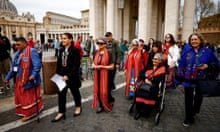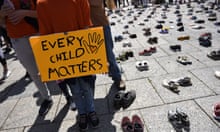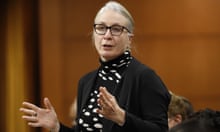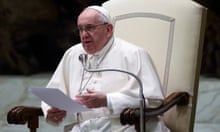A First Nations community in western Canada has discovered the remains of nearly 200 people on the grounds of a former residential school, adding to the growing tally of unmarked graves across the country.
The Lower Kootenay Band said on Wednesday that ground-penetrating radar had revealed 182 human remains at St Eugene’s Mission residential school, near the city of Cranbrook, British Columbia. Some of the remains were buried in shallow graves only three and four feet deep.
“It is believed that the remains of these 182 souls are from the member Bands of the Ktunaxa Nation, neighbouring First Nations communities and the community of ?Aq’am,” the Lower Kootenay band said in a statement.
From the 19th century until the 1990s, more than 150,000 Indigenous children were forced to attend state-funded schools in a campaign to forcibly assimilate them into Canadian society. Abuse was rife at the schools where thousands of children died of disease, neglect and other causes.
The discovery at St Eugene’s adds to the growing list of unmarked graves. Last week, the Cowessess First Nation in Saskatchewan announced the discovery of 751 possible unmarked graves. Last month, the Tk’emlúps te Secwe̓pemc announced they had found 215 unmarked graves, most of which are believed to be children.
Many survivors of the school say that their trauma was compounded by Canada’s failure to face up to what they have known for years: that countless friends and relatives died at the institutions which were supposed to be caring for them.
“People are finally listening to us. And I’m glad that they’re finding them and taking care of what needs to be taken care of,” said Jack Kruger, who in 1956 was taken from his family and transported by train and cattle truck to St Eugene’s. He was six years old at the time.
“As they uncover more graves at other sites, I’ll have to relive it all over again. I don’t anticipate that I’ll stop having nightmares or pain for the next two years. The next two years, you’re going to find many, many, many, many more graves.”
The school opened in 1890 and became an industrial school in 1912. According to the Truth and Reconciliation Commission, it was the site of recurring outbreaks of influenza, mumps, measles, chicken pox and tuberculosis. In 1969, the federal government took over the operation from the Catholic church and shut it down.
Thousands of children attended St Eugene’s, including 100 from the Lower Kootenay Band.
When Kruger arrived at the school, he was beaten for speaking nsyilxcən, the Syilx language he spoke with his family.
“I lost my language for 40 years because they told me it was the ‘devil’s tongue’. I was brainwashed so badly. I didn’t speak to no one in it – and I didn’t let anyone speak the language to me.”
Like thousands of others who attended the schools across the country, Kruger witnessed rampant sexual and physical abuse of his classmates and friends. His best friend took his own life at the age of six after he was raped by a priest, he said.
“I’m still trying to find an answer for why he did it. Coping with with rape and the beatings and starvation must have been too much for him,” said Kruger. “He must have felt that he had nothing left.”
St Eugene’s was run by the Catholic Missionary Oblates of Mary Immaculate, which operated 48 schools, including the Marieval Indian residential school at Cowessess First Nation in Saskatchewan and the Kamloops Indian residential school.
The Oblates have pledged to release all records associated with the schools, but have also cited privacy concerns as a hurdle.
Records list the deaths of 19 students at the institution, highlighting the gap between official figures and what many believe is a vast undercounting of the deceased.
“We need to know who died, we need to know how they died, we need to know who was responsible for their deaths or for their care at the time that they died,” Murray Sinclair, former head of the country’s Truth and Reconciliation Commission, previously told the Guardian. “We need to know why the families weren’t informed. And we need to know where the children are buried.”
In 2000, the building was reopened as the St Eugene Resort, a golf course and casino operated by the Ktunaxa community of ʔAq’am, close to Cranbrook.
Amid growing calls for a papal apology over the Catholic church’s role in the schools, the Canadian Conference of Catholic Bishops (CCCB) said on Wednesday that Pope Francis had agreed to meet Indigenous survivors at the Vatican.
For Kruger, justice and healing remain elusive.
“I thought I dealt with it and I healed from it. But then every night I have nightmares... The priests are chasing after me again. Even if you put them in jail, it’s not going to stop.”
He takes comfort in the love and affection of his family – including grandchildren and a newborn great granddaughter.
“I’m very lucky that I found a woman that cares for me. And I have my children behind me, who want to make sure that I’m okay.”
In 2015, Kruger helped design a statue commemorating residential school survivors.
“I made sure the words ‘Never again’ were on there,” he said. “Never again will any of my children have to go through something like this. Never again will anybody try to take our children away. Never again.”








